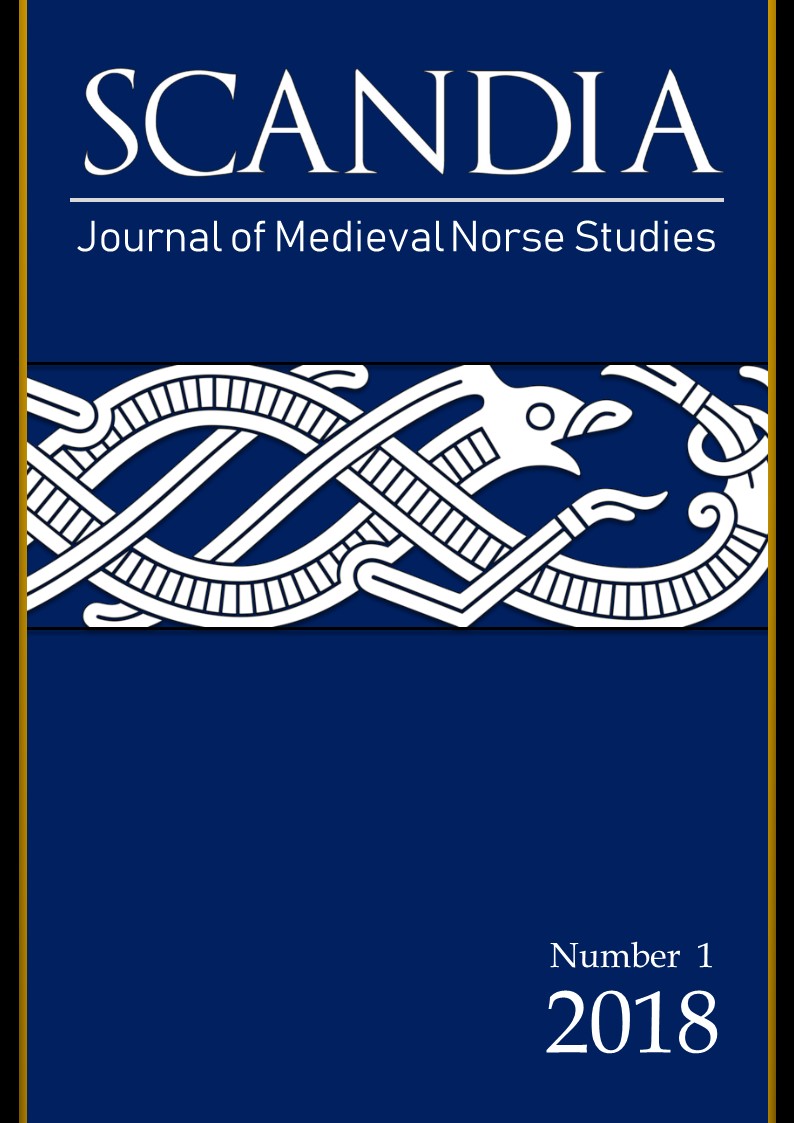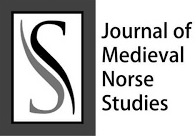The discourse of dreams in medieval saga writing
Abstract
Abstract: The dreams described and discussed in the medieval Icelandic sagas always seem to bear some profound connection to the events of waking life. Scholars have often considered how this aspect of the medieval narratives may reflect either native, pre-Christian beliefs common to the medieval Nordic world or foreign literary traditions imported to the area during the later Middle Ages. Interestingly, several such examinations focus on certain passages in the sagas wherein disputes arise over the perceived significance – or insignificance – of a given dream. However, a close exploration of several such passages – within their respective narrative contexts – seems to reveal more complex attitudes towards the perceived significance of dreams to waking life in the sagas than scholars have sometimes allowed for. Moreover, the discourse of dreams employed by medieval saga writers and used to communicate to their medieval audience may ultimately resist attempts to draw a definitive boundary between that which derives from native traditions, on the one hand, and foreign traditions, on the other.
Resumo: Os sonhos descritos e discutidos nas sagas islandesas medievais parecem sempre ter alguma conexão profunda com os eventos da vida em vigília. Estudiosos têm frequentemente considerado como esse aspecto das narrativas medievais pode refletir crenças nativas pré-cristãs comuns ao mundo nórdico medieval ou a tradições literárias estrangeiras importadas para a região durante a Idade Média. Curiosamente, vários desses exames se concentram em certas passagens nas sagas, nas quais surgem disputas sobre o significado percebido - ou a insignificância - de um dado sonho. No entanto, uma exploração minuciosa de várias dessas passagens - dentro de seus respectivos contextos narrativos - parece revelar atitudes mais complexas em relação ao significado percebido dos sonhos para a vida desperta nas sagas do que os acadêmicos às vezes percebem. Além disso, o discurso dos sonhos empregados pelos escritores de saga medievais e usado para comunicar a sua audiência medieval pode, em última instância, resistir às tentativas de traçar um limite definitivo entre o que deriva das tradições nativas, por um lado, e as tradições estrangeiras, por outro.
Downloads
References
Bibliographical references:
Primary Sources
ANONYMOUS. Austfirðinga sögur. JÓHANNESSON, Jón (Ed.). Íslenzk Fornrit XI. Reykjavík: Hið íslenzka fornritafélag, 1950.
ANONYMOUS. Borgfirðinga sögur. NORDAL, Sigurður and Guðni Jónsson (Eds.). Íslenzk Fornrit III. Reykjavík: Hið íslenzka fornritafélag, 1938.
ANONYMOUS. Brennu-Njáls saga. SVEINSSON, Einar Ól. (Ed.). Íslenzk Fornrit XII. Reykjavík: Hið íslenzka fornitafélag, 1954.
Corpus iuris canonici. FRIEDBERG, Aemilius (Ed.), 2 vols. Leipzig: Bernhard Tauchnitz, 1879.
ANONYMOUS. Das Nibelungenlied, Kudrun. HOFFMANN, Werner (Ed.). Darmstadt: Wissenschaftliche Buchgesellschaft, 1972.
ANONYMOUS. Eddukvæði. KRISTJÁNSSON, Jónas and Vésteinn Ólason (Eds.). Íslenzk Fornrit Goðakvæði and Hetjukvæði, 2 vols. Reykjavík: Hið íslenzka fornritafélag, 2014.
ANONYMOUS. Flateyjarbók: En samling af norske konge-sagaer med indskudte mindre fortællinger om begivenheder i og udenfor Norge samt annaler. VIGFÚSSON, Guðbrandur and C. R. Unger (Eds.), 3 vols. Christiania: P. T. Mallings, 1860–68.
ANONYMOUS. Harðar saga. VILHJÁLMSSON, Bjarni and Þórhallur Vilmundarson (Eds.). Íslenzk Fornrit XIII. Reykjavík: Hið íslenzka fornritafélag, 1991.
ANONYMOUS. Hálfs saga ok Hálfsrekka. SEELOW, Hubert (Ed.). Stofnun Árna Magnússonar á Íslandi Rit 20. Reykjavík: Stofnun Árna Magnússonar, 1981.
ANONYMOUS. Íslendingabók, Landnámabók. BENEDIKTSSON, Jakob (Ed.). Íslenzk Fornrit I. Reykjavík: Hið íslenzka fornritafélag, 1968.
ANONYMOUS. Laxdæla saga. SVEINSSON, Einar Ól. (Ed.). Íslenzk Fornrit V. Reykjavík: Hið íslenzka fornritafélag, 1934.
ANONYMOUS. Membrana regia deperdita. LOTH, Agnete (Ed.). Editiones Arnamagnæanæ Series A, vol. 5. Copenhagen: E. Munksgaard, 1960.
ANONYMOUS. Morkinskinna. JAKOBSSON, Ármann and Þórður Ingi Guðjónsson (Eds.), 2 vols. Íslenzk Fornrit 23–24. Reykjavík: Hið íslenzka fornritafélag, 2011.
ANONYMOUS. Partalopa saga. ANDERSEN, Lisa Præstgaard (Ed.). Editiones Arnamagnæanæ Series B, vol. 28. Copenhagen: C. A. Reitzels forlag, 1983.
ANONYMOUS. Sturlunga saga: efter membranen Króksfjarðarbók, udfylt efter Reykjafjarðarbók. KÅLUND, Kr. (Ed.), 2 vols. Copenhagen and Christiania: Gyldendalske boghandel. Nordisk Forlag, 1906–11.
CHAUCER, Geoffrey. The Riverside Chaucer. BENSON, Larry D. (Ed.). Boston: Houghton Mifflin, 1987.
ANONYMOUS. The Seege of Troye. WAGER, C. H. A. (Ed.). New York: The MacMillan Company, 1899.
ANONYMOUS. Trójumanna saga. LOUIS-JENSEN, Jonna (Ed.). Editiones Arnamagnæanæ Series A, vol. 8. Copenhagen: Munksgaard, 1963.
ANONYMOUS. Vestfirðinga sögur. ÞÓRÓLFSSON, Björn K. and Guðni Jónsson (Eds.). Íslenzk Fornrit VI. Reykjavík: Hið íslenzka fornritafélag, 1943.
ANONYMOUS. Vǫlsunga saga ok Ragnars saga loðbrókar. OLSEN, Magnus (Ed.). STUAGNL 36. Copenhagen: STUAGNL, 1906–8.
ANONYMOUS. Þiðreks saga af Bern. JÓNSSON, Guðni (Ed.), 2 vols. Reykjavík: Íslendingasagnaútgáfan, 1951.
Secondary Sources
An Anglo-Saxon Dictionary. TOLLER, T. Northcote (Ed.). Oxford: Clarendon Press, 1898.
ANDERSSON, Theodore M. “The lays in the lacuna of Codex Regius.” In: DRONKE, Ursula, Guðrún P. Helgadóttir, Gerd Wolfgang Weber, and Hans Bekker-Nielsen (Eds.). Specvlvm norroenvm: Norse Studies in memory of Gabriel Turville-Petre. Odense: Odense University Press, 1981, pp. 6–26.
_____. “An Intepretation of Thidreks saga.” In: LINDOW, John, Lars Lönnroth, and Gerd Wolfgang Weber (Eds.). Structure and Meaning in Old Norse Literature: New Approaches to Textual Analysis and Literary Criticism of Edda and Saga Narrative. Odense: Odense University Press, 1986, pp. 347–77.
ARGÜELLES, Alexander. Viking Dreams: Mythological and religious dream symbolism in the Old Norse sagas. PhD diss., University of Chicago, 1994.
ATWOOD, E. Bagby. “The Rawlinson Excidium Troie – A Study of Source Problems in Mediaeval Tory Literature.” Speculum, 1934, vol. 9, no. 4, pp. 379–404.
KRAMARZ-BEIN, Susanne. Die Þiðreks saga im Kontext der altnorwegischen Literatur. Tübingen and Basel: A. Francke Verlag, 2002.
BRAGASON, Úlfar. “‘Ekki er mark at draumum’: The Fantastic in Islendinga saga.” In: McKINNELL, John, David Ashurst, and Donata Kick (Eds.). The Thirteenth International Saga Conference, Durham University and York University, 6-12 Aug. 2006. Durham: The Centre for Medieval and Renaissance Studies, 2006, pp. 971–77.
Cambridge Dictionary of Christian Theology. FERGUSSON, David A. S., K. Kilby, et al. (Eds.). Cambridge: Cambridge University Press, 2011.
COCHRANE, James Alan. Bright Dreams and Bitter Experiences: Dreams in Six Sagas of Icelanders. PhD diss., University College of London, 2004.
CROCKER, Christopher. “To Dream is to Bury: Dreaming of Death in Brennu-Njáls saga.” Journal of English and Germanic Philology, 2015, vol. 114, no. 2, pp. 261–91.
_____. Situating the Dream: Paranormal Dreams in the Íslendingasögur. PhD diss., University of Iceland, 2016.
FINCH, R. G. “Atlakviða, Atlamál and Vǫlsunga Saga: A Study in Combination and Integration.” In: DRONKE, Ursula, Guðrún P. Helgadóttir, Gerd Wolfgang Weber, and Hans Bekker-Nielsen (Eds.). Specvlvm norroenvm: Norse Studies in memory of Gabriell Turville-Petre. Odense: Odense University Press, 1981, pp. 123–38.
FRIÐRIKSDÓTTIR, Jóhanna Katrín. “Women’s Weapons: A Re-Evaluation of Magic in the Íslendingasögur.” Scandinavian Studies, 2009, vol. 81, no. 4, pp. 409–36.
FRIESEN, William. “Family Resemblances: Textual Sources of Animal Fylgjur in Icelandic Saga.” Scandinavian Studies, 2015, vol. 87, no. 2, pp. 255–80.
GERING, Hugo. “Altnordische sprichwörter und sprichwörtliche redensarten.” Arkiv för nordisk filologi, 1916, vol. 32, pp. 1–31.
GLENDINNING, Robert J. Träume und Vorbedeutung in der Islendinga Saga Sturla Thordarsons: Eine Form- und Stiluntersuchung. Bern and Frankfurt am Main: Herbert Lang and Cie AG, 1974.
HARRIS, Richard L. Concordance to the Proverbs and Proverbial Materials in the Old Icelandic sagas, https://www.usask.ca/english/icelanders/index.html.
KELCHNER, Georgina Dunham. Dreams in Old Norse Literature and their Affinities in Folklore. Cambridge: Cambridge University Press, 1935.
HALL, Alaric. “The Evidence for maran, the Anglo-saxon ‘Nightmares’.” Neophilologus, 2007, vol. 91, pp. 299–317.
JAKOBSSON, Ármann. “Konungasagan Laxdæla.” Skírnir, 1998, vol. 172, pp. 357–83.
_____. “Masculinity and Politics in Njáls saga.” Viator, 2007, vol. 38, pp. 191–215.
_____. The Troll Inside You: Paranormal Activity in the Medieval North. punctum books, 2017.
KRUGER, Steven F. Dreaming in the Middle Ages. Cambridge: Cambridge University Press, 1992.
LARSEN, Sophus. “Antik og nordisk drømmetro” Aarbøger for nordisk oldkyndighed og historie, 1917, pp. 37–85.
LAWING, Sean B. “The Place of Evil: Infant Abandonment in Old Norse Society.” Scandinavian Studies, 2013, vol. 85, no. 2, pp. 133–50.
LIESTØL, Knut. The Origin of the Icelandic Family Sagas, trans. A. G. Jayne. Cambridge, Mass: Harvard University Press, 1930 (reprt. 1974).
LOUIS-JENSEN, Jonna. “Introduction.” In: LOUIS-JENSEN, Jonna (Ed.). Trójumanna saga: The Dares Phrygius Version. Editiones Arnamagnæanæ Series A, vol. 9. Copenhagen: C. A. Reitzels, 1981, pp. i–lxx.
McCREESH, Bernadine. “Animal-Fylgjur – Cultural Memory or Literary Fiction?” In: NORDVIG, A. Mathias Valentin and Lisbeth H. Torfing (Eds.). The 15th International Saga Conference: Sagas and the Use of the Past, 5th–11th August 2012, Aarhus University. Aarhus: Aarhus University, 2012, pp. 225–26.
MILLER, William Ian. “Dreams, Prophecy and Sorcery: Blaming the Secret Offender in Medieval Iceland.” Scandinavian Studies, 1986, vol. 58, no. 2, pp. 101–23.
MUNDAL, Else. Fylgjemotiva i norrøn litteratur. Skrifter fra Instituttene for nordisk språk og litteratur ved universitetene i Bergen, Oslo, Trondheim og Tromsø 5. Oslo, Bergen, and Tromsø: Universitetsforlag, 1974.
NORDAL, Guðrún. “To Dream or Not to Dream: A Question of Method.” In: McKINNELL, John, David Ashurst, and Donata Kick (Eds.). The Thirteenth International Saga Conference, Durham University and York University, 6-12 Aug. 2006. Durham: The Centre for Medieval and Renaissance Studies, 2006, pp. 304–13.
NORDAL, Sigurður. “Formáli.” In: NORDAL, Sigurður and Guðni Jónsson (Eds.). Borgfirðinga saga. Íslenzk Fornrit III. Reykjavík: Hið íslenzka fornritafélag, 1938, pp. v–clv.
NORDMEYER, George. “Source Studies on Kriemhild’s Falcon Dream.” Germanic Review, Jan. 1, 1940, vol. 15, pp. 292–99.
OLSEN, Björn M. Om Gunnlags saga ormstungu: En kritisk undersøgelse. Copenhagen: Høst, 1911.
OLSEN, Magnus. “Fortale.” Vǫlsunga saga ok Ragnars saga loðbrókar. In: OLSEN, Magnus (Ed.). Copenhagen: STUAGNL, 1906–8, pp. i–cii.
Ordbog over det norrøne prosasprog, 2010. Retrieved from http://onp.ku.dk.
ÓLASON, Vésteinn. “Formáli.” In: KRISTJÁNSSON, Jónas and Vésteinn Ólason (Eds.). Eddukvæði. Íslenzk Fornrit Goðakvæði and Hetjukvæði, 2 vols. Reykjavík: Hið íslenzka fornritafélag, 2014, I: pp. 11–287, II: pp. 7–204.
ÓSKARSDÓTTIR, Svanhildur. Universal history in fourteenth-Century Iceland: Studies in AM 764 4to. PhD diss., London: University College London, 2000.
PERKINS, Richard. “The Dreams of Flóamanna saga.” Saga-Book, 1974–77, vol. 19, pp. 191–238.
PHELPSTEAD, Carl. “Hair Today, Gone Tomorrow: Hair Loss, the Tonsure, and Masculinity in Medieval Iceland.” Scandinavian Studies, 2013, vol. 85, no. 1, pp. 1–19.
PORTER, Edel. “Lost in Transmission: Reconstituting Forgotten Verses in Gísla saga Surssonar.” Viking and Medieval Scandinavia, 2013, vol. 9, pp. 173–95.
SMITH, John. The Myſterie of Rhetorique Unveil’d. E. Cotes for George Everſden at the Mayden-head in St. Pauls-Church-yard, 1665.
SONNE, Lasse C. A. “Leksikografiske studier I: Substantivet fylgja.” Arkiv för nordisk filologi, 2009, vol. 124, pp. 5–30.
SÄVBORG, Daniel. “Style.” In: JAKOBSSON, Ármann and Sverrir Jakobsson (Eds.). The Routledge Research Companion to the Medieval Icelandic Sagas. London and New York: Routledge, 2017, pp. 111–26.
The Oxford English Dictionary, 20 vols. Oxford: Clarendon Press, 1989.
THORNDIKE, Lynn. A History of Magic and Experimental Science, 8 vols. New York: Macmillan, 1923.
TIROSH, Yoav. “Víga-Njáll: A New Approach Toward Njáls saga.” Scandinavian Studies, 2014, vol. 86, no .2, pp. 208–26.
TULINIUS, Torfi. “The Matter of the North: fiction and uncertain identities in thirteenth-century Iceland.” In: CLUNIES ROSS, Margaret (Ed.). Old Icelandic Literature and Society. Cambridge: Cambridge University Press, 2000, pp. 242–65.
TURVILLE-PETRE, Gabriel. “An Icelandic Version of the “Somniale Danielis”.” In: ORRICK, Allan H. (Ed.). Nordica et Anglica: Studies in Honor of Stefán Einarsson. The Hague and Paris: Mouton, 1968, pp. 19–36.
_____. “Dreams in Icelandic Tradition.” In: Nine Norse Studies. University College London: Viking Society for Northern Research, 1972, pp. 30–51.
Downloads
Published
Issue
Section
License
The author (s) of the original submitted undertake to comply with the following:
- All authors are publicly responsible for it.
- The authors claim that this original is their own and that they assume full responsibility to third parties, whether moral or patrimonial, by reason of its content, stating that the work does not infringe any intellectual property rights of third parties.
- The author (s) agree to the copyrights of the original to Scandia Journal, to which they grant permission for its reproduction, editing and online publication.
- The author (s) grant their copyright of their original to the Scandia Journal, licensed under the Creative Commons Attribution License, which allows the sharing of this work with the acknowledgment of their authorship.
- The author (s) have permission and are encouraged to cite and distribute their original.



